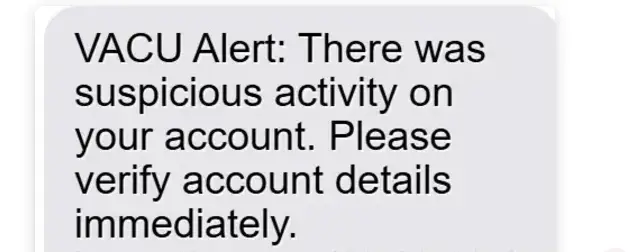The VACU Alert scam is a phishing email targeting Virginia Credit Union customers, first reported in 2021 and resurfacing in 2024. Victims risk losing money and personal data, potentially leading to identity theft.

How Does VACU Alert Scam Work?
VACU Alert is yet another fake message that, oddly enough, was created as a clone of the Virginia Credit Union.
They use text messages to make fake alerts such as, “Suspicious activity detected on your account. Write “Please cheque details right now.” The message has a hyperlink that guides the users to a fake website with an intention of facilitating to the scammers to get more identities of the users.
Through the link victims exposed personal information, accidentally downloading a virus or become a victim of a scam of being tricked into performing fraudulent transactions.
Steps To Avoid Clicking On VACU Alert Scam
The first thing you cannot do is click on the links that were sent in these messages.
If you receive such a message, take these actions —
- Submit your concerns to Virginia Credit Union by forwarding a screenshot or photo to [email protected].
- For your information, your online banking password is at risk, so make sure to change it as soon as you can.
- For concerns about the message, please call VACU directly at 1-800-285-6609 or 804-323-6800.
Protect Yourself from VACU Texts Scam
- Verify Links and Senders: If you get an unfamiliar link or an attachment from someone or if the URL format is strange, do not open it.
Contact Directly: Do not reply to the messages and do not use the contact information given in the message but search on the organisation’s website.
Install Security Software: Instal and update existing antivirus and anti-malware programmes.
Enable Security Extensions: Download browsers having add-ons that can prevent users from accessing phishing sites or show any download warning.
Use Two-Factor Authentication (2FA): Make your accounts more secure with an additional level of protection.
Question Suspicious Messages: It may come via email, text message or a telephone call and it may appear to come from a friend or a family member.
Set Up Spam Filters: Always philtre out any emails and messages that are suspicions.
- Report Fraud: In the event of scams, see page 95 to inform the proper enforcement agency eg Federal Trade Commission (FTC) in the U.S.
Other Ways To Stay Cautious of Phishing Attempt
Avoid Responding: Do not reply to suspicious texts or emails. Engaging with scammers can give them access to your information. Simply delete the message.
Change Your Password: If you’ve clicked on a phishing link or shared login details, immediately update your password to a strong and unique one.
Monitor Your Accounts: Keep an eye on your bank and online accounts for any unauthorized activity.
Scan for Malware: Run a security scan on your devices to detect and remove any malicious software.
READ MORE — My Findings on LEGO Millennium Falcon Giveaway Scam